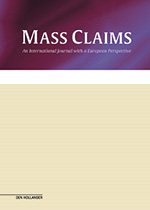Collective Redress in Germany and the Transposition of the Representative Actions Directive
Henner Schläfke and Tobias Lühmann
Germany is known to be hesitant and sometimes even reluctant when it comes to collective redress and has been somewhat late to the party. Is this also true when it comes to the transposition of the Representative Actions Directive? The German Act on the Transposition of the Representative Actions Directive came into force on 13 October 2023. It is the result of much debate within the government and parliament and, as such, a compromise that seeks to strike a balance between the interests of consumers and businesses. Although the scope of representative actions for redress measures goes well beyond what is required by the Directive, the German law's strict regulation of third-party funding, requirement of similarity of claims and lack of reasonable statutory compensation for lawyers make it unlikely that redress actions in Germany will be able to compete with established business models run by professional claimant law firms and legal service providers that are increas...
U heeft op dit moment geen toegang tot de volledige inhoud van dit product. U kunt alleen de inleiding en hoofdstukindeling lezen.
Wanneer u volledige toegang wenst tot alle informatie kunt u zich abonneren of inloggen als abonnee.
Verder in dit artikel:
1. Introduction
2. New representative actions for redress measures
2.1. Scope of actions for redress measures
2.2. Jurisdiction of higher regional courts
2.3. Legal standing
2.3.1. Domestic actions
2.3.2. Cross-border actions
2.4. Electronic register and late pre-judgment opt in
2.5. Procedural steps and types of redress actions
2.5.1. Type 1: Single-stage proceedings with consumers identified by name
2.5.2. Type 2: Multi-stage proceedings with preliminary and final redress judgment as well as implementation proceedings
2.5.3. Type 3: Multi-stage proceedings with preliminary and final redress judgment as well as implementation proceedings
2.6. Further admissibility requirements
2.6.1. Required degree of similarity of individual claims
2.6.2. Minimum number of consumers concerned
2.6.3. Funding
2.7. Redress Settlements
2.8. Disclosure of evidence
2.9. Costs
2.10. Effects of filing an action and suspension of statute of limitations
2.11. Transitional law
3. Model declaratory action
4. Representative actions for injunctive measures
4.1. Scope of actions for injunctive measures
4.2. Jurisdiction of higher regional courts
4.3. Suspension of statutes of limitations
4.4. Information on motions and actions for injunctive measures
5. Reform of actions for skimming off profits
6. Capital Investors Model Proceedings Act
7. Concluding remarks


